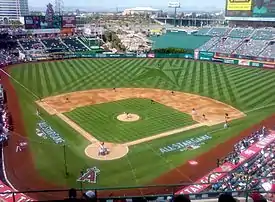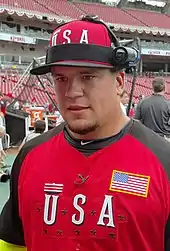All-Star Futures Game
The All-Star Futures Game is an annual baseball exhibition game hosted by Major League Baseball (MLB) in conjunction with the mid-summer MLB All-Star Game. A team of American League-affiliated prospects competes against a team of National League-affiliated prospects. From the inaugural 1999 event through 2018, teams of prospects from the United States faced off against teams of prospects from other countries.
| All-Star Futures Game | |
|---|---|
| Frequency | Annual |
| Location(s) | Varies (see prose) |
| Inaugurated | July 11, 1999, Fenway Park, Boston, Massachusetts |
| Most recent | July 8, 2023, T-Mobile Park, Seattle, Washington |
| Previous event | July 16, 2022, Dodger Stadium, Los Angeles, California |
| Next event | July 2024, Globe Life Field, Arlington, Texas |
| Participants | Minor League Baseball players |
| Organized by | Major League Baseball |
| Website | Official website |
Origins

The Futures Game was conceived by Jimmie Lee Solomon, an Executive Vice President of Baseball Operations for Major League Baseball, looking for an event to showcase the minor leagues and round out the All-Star week festivities.[1] Early versions of the game created marginal interest in the baseball community, but the event has attracted more attention in later years.
Format
Rosters are selected by a joint committee consisting of people from Major League Baseball, MLB.com, and Baseball America magazine.[2] All 30 MLB organizations are represented, with up to two players from any organisation and 25 players per team. One team is made up of prospects from American League organizations and the other of National League prospects. From 1999 to 2018, teams were divided into U.S. and World teams based on place of birth. Any player selected to the All-Star Futures Game but promoted to the majors prior to the game is replaced.
Players born in Puerto Rico were part of the World team despite being U.S. citizens by birth, because that territory has its own national baseball federation and national team.
The game is played by the same rules listed in the Official Baseball Rules published by Major League Baseball. Exceptions are game duration and the handling of tie games. From 2008 through 2018, games lasted 9 innings. From 1999 to 2007 and since 2019, games last seven innings. Through 2018, up to two extra innings were available to settle a tie after playing all regulation innings. In 2019 and since 2021, one extra inning may be played, with each half-inning starting with a runner at second base, the last player put out. The home team wins if they take the lead in the 7th or 8th inning; the visitors win if they hang on in either inning; the game is over if it is tied after eight.
Changes in 2008
Two major changes took place in the 2008 game:
- For the first time, the United States team was drawn from the pool of players selected by USA Baseball for the 2008 Summer Olympics in Beijing.[3]
- The game lasted nine innings in regulation, rather than seven.
Changes in 2019
Two major changes took place in the 2019 game:[4]
- The teams are now called the National League and American League. Players for each are drawn from affiliates of MLB teams in the corresponding MLB leagues.
- The regulation game is now seven innings. If the game is tied after seven, one additional inning is played, with each batting team starting its half with a runner on second base. The 2019 game was tied at two after seven innings of regulation, no runs were scored in the eighth inning, and that was how the game ended.
Larry Doby Award
- Note: For the award winners, see the "MVP" column in the "Results" section (below).
Each year, an award is presented to the game's most valuable player. Multiple award winners have gone on to become MLB All-Stars, denoted in the below table of game results. In 2003, the award name was changed from Futures Game Most Valuable Player Award to the Larry Doby Award, named after National Baseball Hall of Fame inductee Larry Doby (1923–2003).[5] Note that the similarly named Larry Doby Legacy Award is an unrelated award presented by the Negro Leagues Baseball Museum.
Results
| MVP | Most valuable player |
|---|---|
| † | MLB All-Star on a future occasion |
.jpg.webp)

.jpg.webp)
|
|
Notes
- Game shortened to seven innings after a four-hour rain delay in the first inning.
- First and only pitcher to win the Larry Doby Award.
- Game lasted the maximum of eight innings.
- Game cancelled due to the COVID-19 pandemic.
Media coverage
From 1999 to 2013, ESPN2 held the rights to the futures game. From 2014 to 2021, MLB Network held the rights. Beginning with the 2022 season, the game streams on Peacock.
References
- "Solomon has many irons in the fire". USA Today. May 8, 2001. Retrieved July 12, 2015.
- Nick Cammarota (June 26, 2008). "Futures Game rosters filled with top prospects". mlb.com. Archived from the original on June 27, 2008. Retrieved June 27, 2008.
- Jonathan Mayo (June 19, 2008). "Futures managers have New York ties". MLB.com. Archived from the original on June 22, 2008. Retrieved June 25, 2008.
- Feinsand, Mark (July 8, 2019). "Futures Game full of surprises, ends in tie". MLB.com. Retrieved July 8, 2019.
- "Larry Doby Award". Baseball-Almanac. Retrieved December 11, 2011.
- "Yankee farmhand helps beat U.S." Herald-Journal. Associated Press. July 12, 1999. p. B4. Retrieved July 12, 2015 – via Google News Archive Search.
- "Burroughs leads U.S. to victory". The Spokesman-Review. Associated Press. p. C4. Retrieved July 12, 2015 – via Google News Archive Search.
- "Futures game box score". USA Today. July 9, 2001. Retrieved July 8, 2012.
- "2002 Futures Game Box Score". Baseball America. July 8, 2002. Retrieved July 8, 2012.
- "Futures game box score". USA Today. May 20, 2005. Retrieved July 8, 2012.
- Callis, Jim (July 11, 2004). "2004 Futures Game". Baseball America. Retrieved July 8, 2012.
- Callis, Jim (July 10, 2005). "2005 Futures Game: World 4, U.S. 0". Baseball America. Retrieved July 8, 2012.
- "Gameday 2006". MLB.com. Retrieved August 2, 2011.
- "Prospects: Futures Game: Futures Game 2007 Box Score". Baseball America. July 8, 2007. Retrieved August 2, 2011.
- "World Futures vs. U.S. Futures – July 13, 2008 | MLB.com: Gameday". MLB.com. July 13, 2008. Retrieved August 2, 2011.
- "World Futures vs. U.S. Futures – July 12, 2009 | MLB.com: Gameday". MLB.com. July 12, 2009. Retrieved August 2, 2011.
- "World Futures vs. U.S. Futures – July 11, 2010 | MLB.com: Gameday". MLB.com. July 11, 2010. Retrieved August 2, 2011.
- "World Futures vs. U.S. Futures – July 10, 2011 | MLB.com: Gameday". MLB.com. July 10, 2011. Retrieved July 8, 2010.
- "World Futures vs. U.S. Futures – July 8, 2012 | MLB.com: Gameday". MLB.com. July 8, 2012. Retrieved July 8, 2010.
- "2013 All-Star Game – Arizona Diamondbacks' Matt Davidson powers U.S. past World in Futures Game". ESPN.com. July 14, 2013. Retrieved July 12, 2015.
- "Joey Gallo's homer backs stellar U.S. pitching in Futures Game win". Chicago Cubs. Retrieved July 12, 2015.
- Steve Gardner, USA TODAY Sports (July 12, 2015). "Kyle Schwarber headlines Team USA's win in Futures Game". USA TODAY. Retrieved July 12, 2015.
- Cassavell, AJ. "MVP Moncada powers World rout at Futures". MLB.com. Archived from the original on July 12, 2016. Retrieved July 10, 2016.
- Feinsand, Mark (July 9, 2017). "USA rides Honeywell, big bats to Futures win". MLB.com. Retrieved May 15, 2018.
- Feinsand, Mark (July 15, 2018). "USA outslugs World in 8-homer Futures Game". MLB.com. Retrieved July 15, 2018.
- Mayo, Jonathan (July 7, 2019). "These players turned heads at Futures Game". MLB.com. Retrieved July 8, 2019.
- Castrovince, Anthony (July 3, 2020). "All-Star Game Canceled; Dodgers to Host in 2022". MLB.com. Retrieved July 3, 2020.
- "AL Futures 3, NL Futures 8 (Final Score)". MLB Gameday. July 11, 2021. Retrieved July 12, 2021.
- "Cubs Prospect Brennen Davis Homers Twice as NL Wins Futures Game". Sports Illustrated. AP. July 11, 2021. Retrieved July 12, 2021.
- "Yankees' Jasson Dominguez, A's Shea Langeliers lead AL to Futures Game win". July 17, 2022.
- Callis, Jim (July 9, 2023). "Here are the top moments from the 2023 Futures Game". MLB.com. Retrieved July 9, 2023.